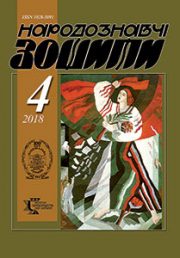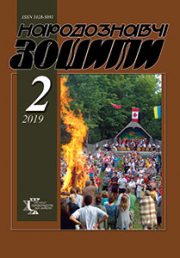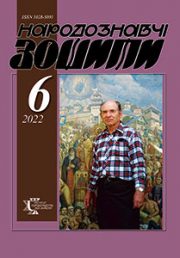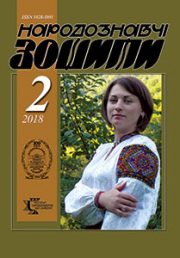The Ethnology Notebooks. 2019, № 4 (148), 818—822
УДК 811.161.2’373.2
DOI https://doi.org/10.15407/nz2019.04.818
HRYHORII DEMIAN — COLLECTOR AND RESEARCHEROF MICROTOPONYMS
SOKIL-KLEPAR Nataliya
ORCID ID: https://orcid.org/0000-0002-4156-5978
Candidate of Philological Sciences (PhD),
Senior Researcher
Department of specialists in folklore
Institute of Ethnography of the National Academy of Sciences of Ukraine
Svobody Avenue 15, 79000, Lviv,Ukraine.
Contacts: e-mail: nsokil@ukr.net
Abstract. The article describes the gathering and research activity of the Western Ukrainian microtoponyms by the famous Ukrainian historian Hryhorii Demian. It is known that there are people who create science, and without them it does not function perfectly. H. Demian is a multifaceted man who contributed to establishing the rhythm of history, ethnography and folklore studies.The purpose of the work is to analyze materials of microtoponyms by Н. Demіan. The object of the research is microlocal names, which are collected by Н. Demian. The urgency of the work is to highlight H. Demian’s activities, in particular his linguistic heritage. The purpose of the article is to properly disclose the practical results of the linguistic activity of the researcher, that will enable to objectively estimate G. Demian’s contribution to the development of modern onomastics.
His activities partially cover literature and linguistics. The historian’s linguistic preferences first of all are reflected in the systematic collection of microtoponyms.
Microtoponyms are local geographic names used for nomination of spatial fragments: parts of settlements, fields, forests, hills, wells, streams, ravines, various structures, etc. Such important markers of the national scope of microtoponyms attract H. Demіаn. His records were not chaotic, not amateurish, but highly skilled. Firstly, H. Demіаn gathered all microtoponymic materials based on a questionnaire, which was created in 1962 by a well-known linguist K. Tsiluiko. By the way, this questionnaire still has not lost its relevance because it is used by modern specialists in onomastics. Secondly, H. Demian localized each object from the direct instructions of the informants themselves, recorded all lexical items with emphasis according to the dialect, which is of considerable value for dialectologists, specialists in onomastics, historians of the language.
Materials on microtoponyms, which are preserved mainly in manuscripts, were recorded by the author from the 70s of the twentieth century.The collector conducted a serious survey for the detection of microtoponyms in Skole, Drohobych, and Stryi districts of Lviv region; Bohorodchany, Rozhniativ districts of Ivano-Frankivsk region; Kamianets-Podilskyi district of Khmelnytskyi region; Sokyriany district of Chernivtsi region. However, this is not a complete list of districts which was worked out by H. Demian.
Demіan presented the scientific community with thousands of names of micro-objects requiring further correct linguistic reading, systematization, and analysis, as well as creation of a variety of onomastic lexicons, atlases, so that future generations would know the history of their region preserved in the names.
Keywords: microtoponym, collecting activity, questionnaire, onomastics.
Received 9.07.2019
REFERENCES
Tsiluiko, K.K. (1962). The program of collecting materials for the study of toponymic Ukraine. Kyiv [in Ukrainian].
Demian, H. (Ed.). (1981). Boykivshchyna. Calendar and family ritual. Toponymy (Vol. 6). Department of Manuscripts of the Institute of Art Studies, Folklore Studies and Ethnology M.T. Rylsky. F. 14—5. Od. zb. 466 d. Arch 143—322 [in Ukrainian].
Demian, H. (2007). Hrabovets (Istoryko-narodoznavche doslidzhennia). Lviv [in Ukrainian].
Tsiluiko, K.K. (1951). About the work of the dialectologist on toponymics. Dialectological Bulletin (Issue III, pp. 69—81). Kyiv [in Ukrainian].
Chuchka, P.P. (2005). Surnames of Transcarpathian Ukrainians. Historical-etymological dictionary. Lviv [in Ukrainian].
Dictionary of the Ukrainian language. (1980). (Vol. XI). Kyiv [in Ukrainian].
Sokil, V. (Ed.). (2016). Volosianka in folklore and dialect. Lviv [in Ukrainian].
Triiniak, I.I. (2005). Dictionary of Ukrainian names. Kyiv [in Ukrainian].
Onyshkevych, M.Y. (1984). Dictionary of Boiko dialects (Part 1). Kyiv [in Ukrainian].
Matiiv, M.D. (2013). Dictionary of dialects of the central Boykivshchyna. Kyiv; Simferopol [in Ukrainian].







